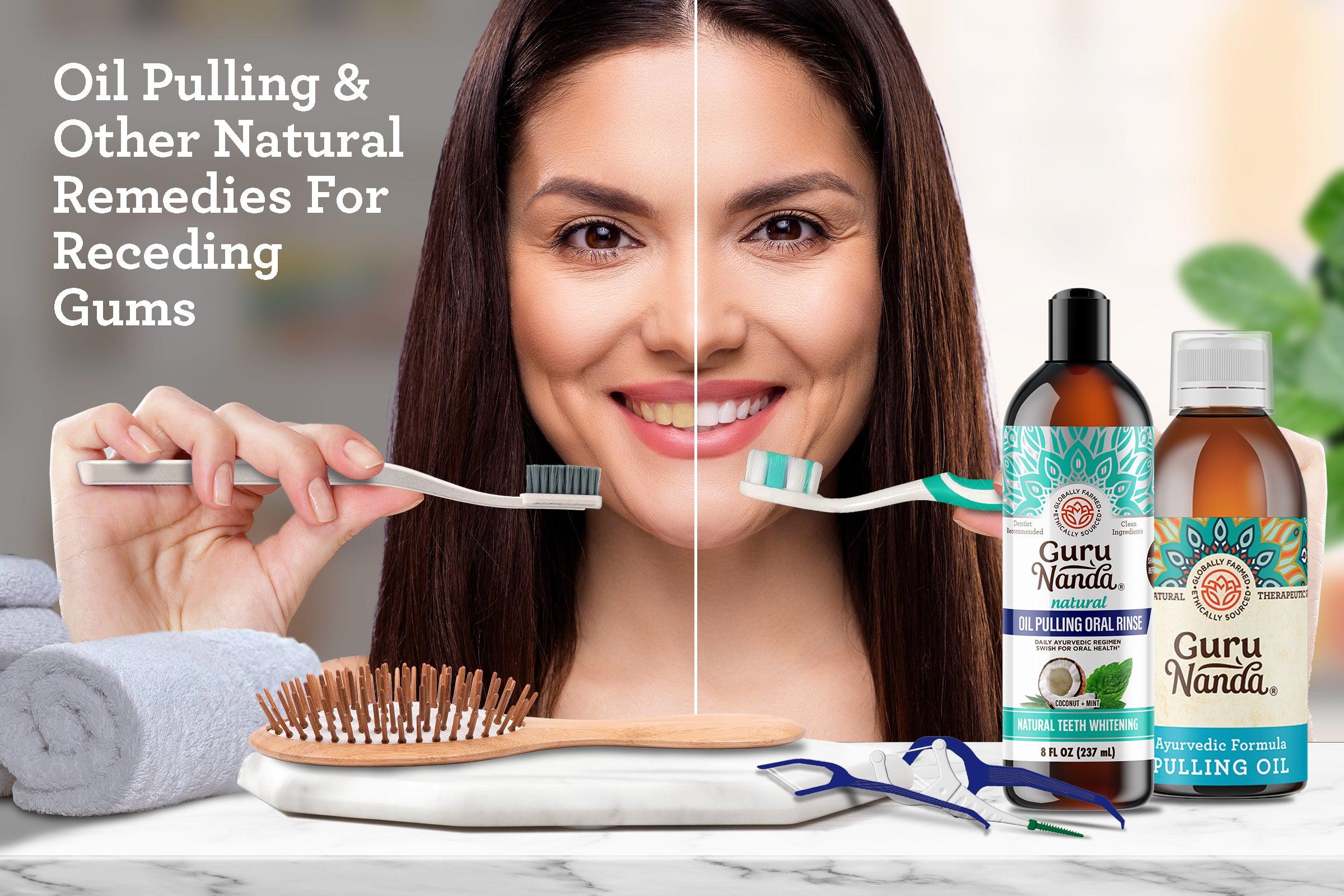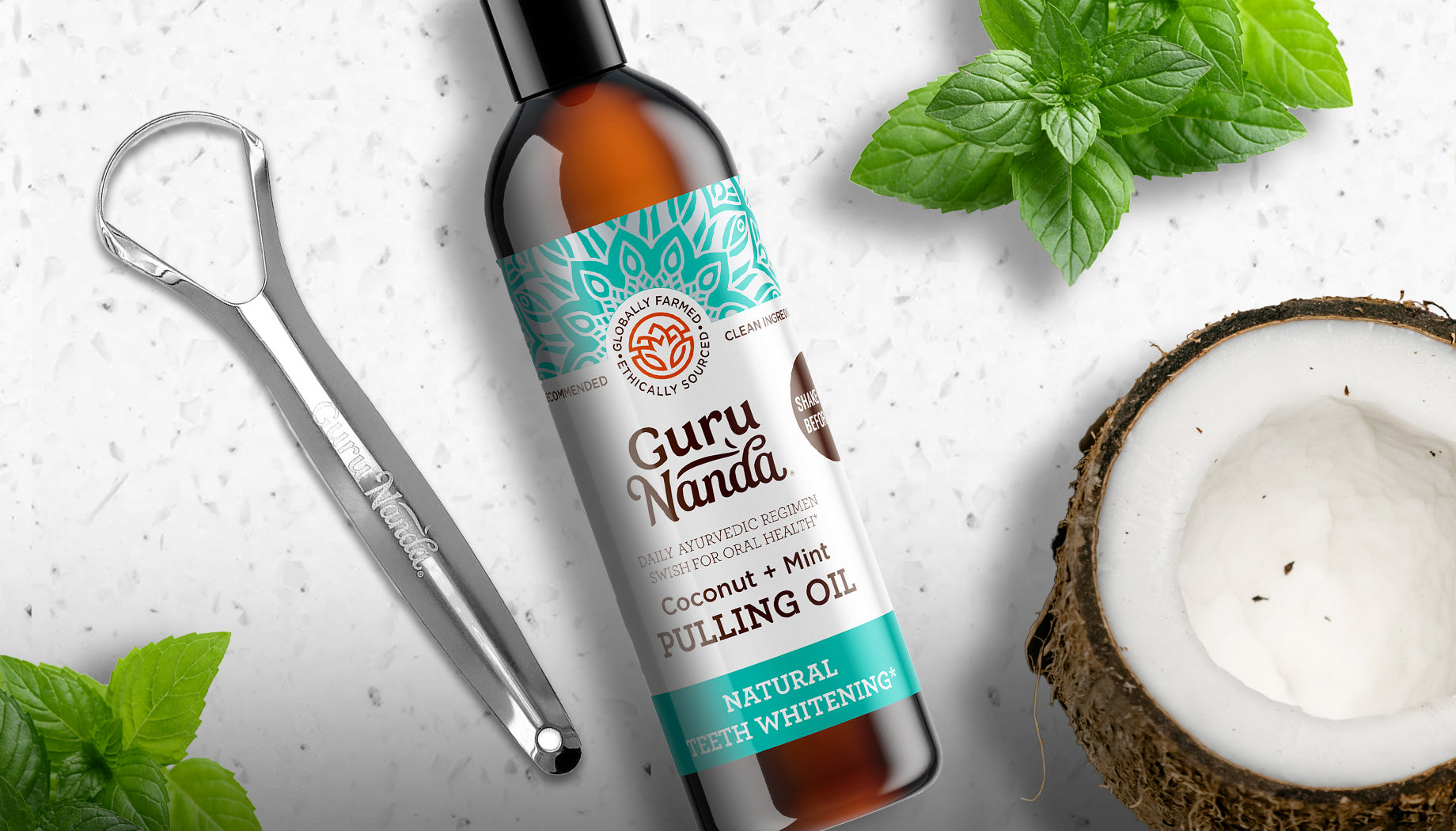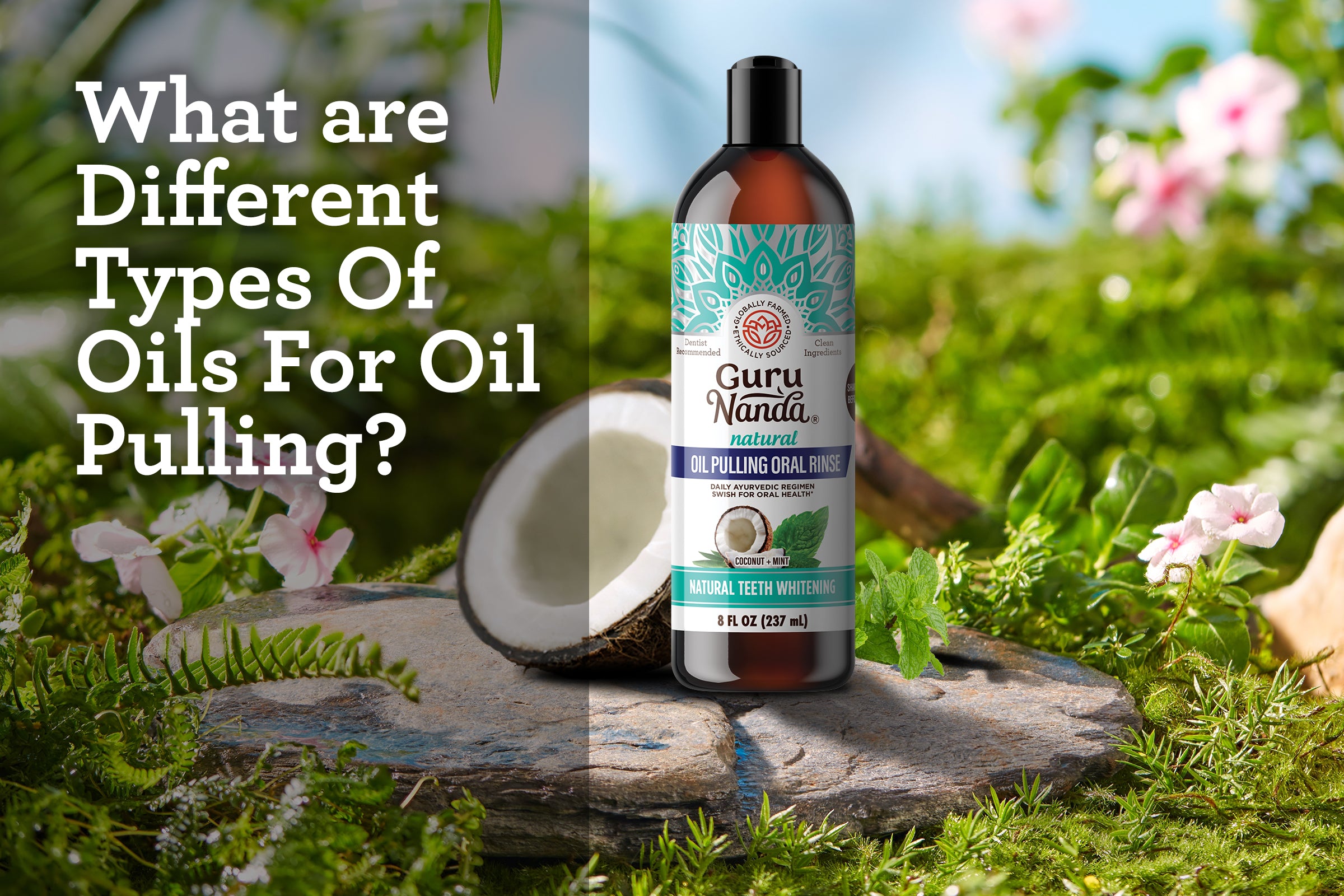La recesión gingival es una preocupación generalizada que afecta a aproximadamente el 50 % de los estadounidenses mayores de 30 años y puede comenzar incluso en la adolescencia. Ignorar este problema podría provocar urgencias dentales graves, por lo que es crucial abordar los síntomas de inmediato consultando a un dentista. Mientras tanto, diversas estrategias naturales ofrecen esperanza para mitigar los casos leves y prevenir un mayor deterioro. Esta guía introductoria explorará el fenómeno de la recesión gingival y presentará remedios naturales, como el enjuague bucal con aceite, como posibles ayudas para su salud dental. [ 1 ]
¿Qué son las encías retraídas?
La recesión gingival se produce cuando el tejido gingival que rodea los dientes se desgasta o se retrae, dejando expuesta una mayor parte del diente y su raíz. Esta afección puede crear pequeños espacios vulnerables donde proliferan bacterias dañinas, lo que, si no se controla, provoca mayor sensibilidad dental, acumulación de placa y, si no se controla, una recesión gingival avanzada. Entre los factores que contribuyen a esta afección se incluyen la mala higiene dental, el cepillado agresivo, el envejecimiento, el tabaquismo y la genética. A pesar de su progresión gradual, que dificulta la detección temprana, la sensibilidad dental suele ser un indicio de su aparición. Es fundamental comprender que, si bien los tratamientos naturales pueden ayudar a controlar la recesión gingival y evitar que empeore, por sí solos no pueden revertir la afección. Además, la recesión gingival no tratada puede derivar en enfermedades periodontales, un grupo de infecciones graves que dañan el tejido blando y el hueso que sostiene los dientes. Estas enfermedades pueden provocar complicaciones adicionales, como infecciones graves y pérdida de dientes y huesos, lo que subraya la importancia de la intervención temprana y la atención dental integral para mitigar los riesgos y proteger la salud bucal. [ 2 ]
Síntomas de retracción de las encías
La recesión gingival se manifiesta a través de varios signos clave, como la inflamación de las encías (encías rojas, hinchadas y sensibles debido a la irritación o inflamación), que suele ser un indicador temprano de recesión. La sensibilidad dental (dientes que experimentan molestias al exponerse a sustancias calientes, frías o azucaradas debido a la exposición de las raíces) también es consecuencia de esta afección. Además, la recesión gingival puede desarrollar bolsas periodontales (espacios entre los dientes y las encías que albergan bacterias y agravan la enfermedad periodontal), lo que favorece la proliferación de bacterias que causan mal aliento y son señal de una enfermedad periodontal más avanzada. Asimismo, a medida que las encías se retraen, pierden su sujeción a los dientes, lo que provoca aflojamiento y mayor movilidad (dientes que se mueven más de lo habitual, lo que indica un soporte debilitado). Un factor común que contribuye a la recesión gingival es la acumulación de placa en la línea gingival (una película de bacterias que causa irritación e inflamación), que, si no se elimina, provoca inflamación y sangrado después del cepillado y el uso de hilo dental, lo cual es un signo común de irritación gingival o de enfermedad periodontal en etapa temprana (gingivitis). Con el tiempo, si la placa no se controla adecuadamente, puede provocar afecciones más graves de las encías, como la periodontitis. Abordar estos síntomas a tiempo puede ayudar a mitigar la progresión de la recesión gingival y a mantener la salud bucal.
¿Es posible curar las encías retraídas de forma natural?
La salud de las encías es crucial para el bienestar dental general, y aunque las encías no se regeneran como la piel, las medidas proactivas pueden ayudar a protegerlas de daños mayores. Los remedios caseros pueden ofrecer alivio y prevenir el empeoramiento de las afecciones, a pesar de sus limitaciones para restaurar las encías a su estado original. Sin embargo, es esencial complementar estas estrategias naturales con consultas dentales profesionales. Aquí, descubriremos seis enfoques naturales efectivos para apoyar la salud de sus encías y mantener una sonrisa radiante.
Formas naturales de prevenir la retracción de las encías
Explorar remedios naturales para la salud de las encías puede ofrecer alivio y medidas preventivas contra los problemas de encías sin necesidad de procedimientos invasivos. A continuación, se presentan varios métodos efectivos:
Cepillarse los dientes con un cepillo de dientes súper suave
Usar un cepillo de dientes súper suave puede ayudar a reducir el riesgo de irritar las encías y causar recesiones. Este método suave garantiza una limpieza eficaz sin dañar las encías sensibles. Optar por un cepillo de dientes "suave como una pluma" como Butter On Gums ™ de GuruNanda puede ser especialmente beneficioso, ya que protege los dientes y las encías de daños a la vez que limpia a fondo las superficies y los espacios alrededor de los dientes.
Uso de hilo dental
El uso del hilo dental es esencial para la higiene bucal, ya que elimina la placa y las partículas de comida de las zonas inaccesibles para el cepillo de dientes, especialmente entre los dientes y bajo la línea de las encías. Este proceso es vital porque estas zonas ocultas son focos de crecimiento bacteriano, lo que puede provocar la formación de sarro. El sarro, una forma endurecida de placa, contribuye a la enfermedad periodontal. Las investigaciones indican que el uso regular del hilo dental está relacionado con una ligera reducción de la prevalencia de periodontitis. Sin embargo, al tratarse de un estudio transversal, no se puede establecer una relación causal entre el uso del hilo dental y la periodontitis; el estudio solo muestra una correlación en un momento específico, no que un factor cause el otro. Por lo tanto, el uso diario de hilo dental de alta calidad es crucial para prevenir la recesión gingival y mantener la salud dental general, manteniendo las zonas interdentales limpias y libres de bacterias dañinas. [ 3 ]
Encías retraídas y enjuague bucal con aceite
Esta antigua técnica ayurvédica ofrece numerosos beneficios e implica hacer buches con aceite durante 5 a 20 minutos al día. El aceite de coco , conocido por sus propiedades antibacterianas, ha demostrado ser eficaz para reducir la acumulación de placa, aliviar los síntomas de sequedad bucal y disminuir la inflamación de las encías, factores que pueden contribuir a la recesión gingival. Un estudio de 2009 también destacó los beneficios del aceite de sésamo, aunque señaló limitaciones debido a su enfoque en participantes más jóvenes y al pequeño tamaño de la muestra. Para quienes buscan una opción más eficaz y clínicamente probada , el enjuague bucal GuruNanda Oil Pulling Rinse es una excelente opción. Su fórmula única, enriquecida con diversos aceites esenciales y vitaminas, proporciona todos estos beneficios en tan solo 2 a 10 minutos, lo que lo convierte en una alternativa más práctica al régimen tradicional de 20 minutos. Este producto no solo mejora la higiene bucal al contribuir a abordar problemas como la sequedad bucal y el mal olor, sino que también ayuda a mejorar el color de los dientes. [ 4 ][ 5 ]
Enjuague bucal
El uso regular de enjuagues bucales terapéuticos puede ayudar a reducir las bacterias, controlar la acumulación de placa y mantener unas encías sanas. Los aceites esenciales como el eucalipto, el árbol de té y la menta piperita son tradicionalmente conocidos por sus propiedades antimicrobianas y pueden añadirse al agua para preparar un enjuague casero o encontrarse en productos preformulados como el Armonizador del Aliento de GuruNanda para un cuidado bucal más seguro y eficaz.
Encías retraídas y aceites esenciales
Aceite de eucalipto
Usar aceite de eucalipto diluido en aceite de coco en una proporción de 1:10 y masajearlo sobre las encías antes de enjuagarse puede ser beneficioso para la salud bucal. Como alternativa, puede agregar una o dos gotas de aceite al agua y usarlo como enjuague bucal. El aceite de eucalipto es reconocido por sus propiedades antiinflamatorias y germicidas, que pueden ayudar a regenerar el tejido gingival y reducir la presencia de bacterias, lo que lo convierte en una opción eficaz para mantener la salud bucal . [ 6 ][ 7 ]
Aceite esencial de menta
El aceite de menta, conocido por su aroma vigorizante, también es reconocido por sus propiedades antimicrobianas , que pueden ayudar a inhibir el crecimiento de bacterias bucales dañinas. Esto lo convierte en una valiosa medida preventiva contra la recesión gingival. Para un cuidado eficaz de las encías, puede usar aceite de menta diluido en aceite de coco en una proporción de 1:10 para masajear las encías y luego enjuagarlas bien. Como alternativa, añadir unas gotas de aceite de menta al agua y usarlo como enjuague bucal también puede ser beneficioso. [ 8 ]
Aceite de árbol de té
Un estudio de 2013 subraya la eficacia del aceite de árbol de té para minimizar las bacterias dañinas en la boca, ofreciendo una vía natural para mantener la integridad de las encías y prevenir la recesión. Usar aceite de árbol de té diluido en aceite de coco en una proporción de 1:10 para masajear las encías y enjuagarse después puede ser beneficioso. Como alternativa, añadir unas gotas de aceite de árbol de té al agua para enjuagarse la boca también puede ser eficaz. [ 8 ]
Si bien los aceites esenciales como el eucalipto, el árbol de té y la menta piperita son beneficiosos para la salud bucal, deben usarse con precaución para evitar irritaciones. Para una opción más segura y suave, considere usar productos preformulados como los aceites para enjuague bucal de GuruNanda . Estos productos incorporan aceites esenciales como el árbol de té, el orégano y la menta piperita en cantidades mínimas, con aceites más beneficiosos y vitaminas. Además, el aceite de menta piperita está incluido en la fórmula original de GuruNanda, el aceite para enjuague bucal , y en los aceites para enjuague bucal de coco , lo que proporciona propiedades antimicrobianas eficaces en un formato más suave. Este enfoque le permite disfrutar de los beneficios de los aceites esenciales de forma segura y eficaz.
Otros cuidados preventivos
Té verde
El consumo regular de té verde, sin azúcares ni saborizantes añadidos, ofrece beneficios antibacterianos , contribuyendo así a la salud periodontal. Sus propiedades naturales inhiben el crecimiento bacteriano, lo que favorece la salud dental en general. [ 9 ]
Enjuagues con agua salada
Preparar una solución sencilla de agua salada y usarla para enjuagarse la boca puede ayudar a combatir las bacterias potencialmente responsables de los problemas de encías. Sus propiedades calmantes también reducen la inflamación. Enjuagarse la boca dos o tres veces al día puede favorecer la salud de las encías.
Es fundamental reconocer que, si bien métodos alternativos como los enjuagues con agua salada o el consumo regular de té verde pueden favorecer la salud de las encías, no deben considerarse sustitutos de las prácticas habituales de higiene bucal. Estos enfoques buscan complementar y mejorar las rutinas diarias de cuidado bucal. Un manejo eficaz de la salud bucal requiere el compromiso con prácticas regulares como el enjuague bucal con aceite, el raspado lingual, el cepillado, el uso de hilo dental, el enjuague bucal y la asistencia a revisiones dentales. Además, mantener una dieta saludable, minimizar el consumo de alimentos azucarados y reducir o dejar de fumar también son medidas esenciales. En conjunto, estas medidas conforman una estrategia integral para preservar la salud bucal.
¿Cómo prevenir la recesión de las encías?
Para proteger tu salud bucal y prevenir la recesión de encías, es fundamental adoptar una rutina de higiene bucal exhaustiva. Comienza con el enjuague bucal con aceite, que ayuda a reducir las bacterias y la placa, utilizando esta antigua técnica de enjuagarse la boca con aceite. A continuación, raspa la lengua para eliminar las bacterias que causan el mal aliento, lo que resulta en una boca más limpia y un aliento más fresco. Continúa cepillando tus dientes con un cepillo de cerdas suaves como Butter On Gums ™ para limpiarlos a fondo sin dañar las encías; recuerda que las pasadas suaves son clave para prevenir el daño de las encías. Incorpora el hilo dental para combatir la placa y las bacterias que se acumulan entre los dientes y debajo de la línea de las encías, puntos cruciales que tu cepillo no alcanza. Usar hilo dental con regularidad es vital para prevenir la recesión de encías y mantener la salud dental. Completa tu rutina con un enjuague bucal terapéutico como Breath Harmonizer para eliminar cualquier bacteria residual. Esta rutina completa (enjuague bucal con aceite, raspado de lengua, cepillado, uso de hilo dental y enjuague bucal) crea una defensa formidable para tu salud bucal, manteniendo encías y dientes en óptimas condiciones.
Conclusión
En conclusión, abordar la recesión gingival requiere un enfoque multifacético que combine el cuidado dental profesional con remedios naturales y una rutina de higiene bucal rigurosa. Prácticas como el enjuague bucal con aceite, el uso de aceites esenciales y el consumo de té verde complementan los métodos tradicionales de cepillado, uso de hilo dental y enjuague bucal. Estas prácticas pueden contribuir a la salud gingival y potencialmente ralentizar la progresión de la recesión, así como a retrasar su aparición, pero no deben considerarse como el único tratamiento para combatir afecciones gingivales existentes. Si bien los remedios naturales ofrecen beneficios significativos, no deben reemplazar las revisiones y limpiezas dentales regulares. Al integrar estas estrategias holísticas y convencionales, las personas pueden proteger eficazmente la salud gingival, asegurando una sonrisa sana y un bienestar dental general durante años.
Preguntas frecuentes
P: ¿Qué causa la recesión de las encías?
R: La recesión de las encías puede ser causada por varios factores, incluidos hábitos de cepillado agresivos, mala higiene bucal, enfermedad periodontal (enfermedad de las encías), predisposición genética, uso de tabaco, tabaquismo, cambios hormonales (como los que ocurren durante el embarazo) e incluso cuidado dental inadecuado, como dentaduras postizas o aparatos ortopédicos mal ajustados.
P: ¿Es posible revertir la recesión de las encías?
R: Una vez que el tejido gingival ha retrocedido, no puede volver a crecer por sí solo. Sin embargo, la progresión de la recesión gingival puede ralentizarse con el cuidado y el tratamiento dental adecuados. En algunos casos, procedimientos dentales como los injertos de encía pueden restaurar la línea gingival y proteger las raíces dentales expuestas.
P: ¿Cuáles son los síntomas de la recesión de las encías?
R: Los síntomas incluyen mayor sensibilidad dental (especialmente a estímulos calientes, fríos o dulces), dientes que parecen más largos debido a la recesión gingival, raíces expuestas, dientes flojos y cambios en el color del diente cerca de la línea de la encía. Algunas personas también pueden notar una muesca en la línea de la encía.
P: ¿Puede el oil pulling revertir la recesión de las encías?
R: Si bien el enjuague bucal con aceite puede ayudar a reducir la inflamación y las bacterias, lo que resulta en encías más sanas, no puede revertir la recesión gingival. El tejido gingival que ya se ha retraído no puede volver a crecer. Sin embargo, el enjuague bucal con aceite puede ayudar a ralentizar la progresión de la recesión y reducir el riesgo de enfermedades periodontales. [ 10 ]
P: ¿Con qué frecuencia debo hacer oil pulling para que sea efectivo contra la recesión de las encías?
R: Para obtener los mejores resultados, se recomienda practicar el enjuague bucal con aceite a diario, preferiblemente por la mañana antes de comer o beber. La constancia es clave para ver mejoras en la salud bucal y controlar los síntomas asociados con la recesión gingival.
P: ¿Existe algún aceite específico recomendado para hacer oil pulling para ayudar con la recesión de las encías?
R: El aceite de coco se recomienda a menudo para el enjuague bucal con aceite debido a su alto contenido de ácido láurico , que ofrece propiedades antiinflamatorias y antimicrobianas beneficiosas para la salud de las encías. Nuestro producto, GuruNanda Oil Pulling Rinse , combina los beneficios del aceite de coco con aceites esenciales adicionales para potenciar su eficacia. [ 11 ]
[1] - https://www.nidcr.nih.gov/research/data-statistics/periodontal-disease/adults
[2] - https://www.ncbi.nlm.nih.gov/pmc/articles/PMC4944726/
[3] - https://www.ncbi.nlm.nih.gov/pmc/articles/PMC5601277/
[4] - https://www.ncbi.nlm.nih.gov/pmc/articles/PMC7535963/
[5] - https://pubmed.ncbi.nlm.nih.gov/19336860/
[6] - https://www.ncbi.nlm.nih.gov/pmc/articles/PMC10044518/
[7] - https://pubmed.ncbi.nlm.nih.gov/18672986/
[8] - https://www.ncbi.nlm.nih.gov/pmc/articles/PMC4054083/
[9] - https://www.ncbi.nlm.nih.gov/pmc/articles/PMC3459493/
[10] - https://www.ncbi.nlm.nih.gov/pmc/articles/PMC9602184/
[11] - https://www.ncbi.nlm.nih.gov/pmc/articles/PMC6923562/






